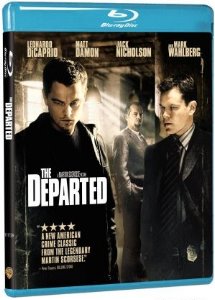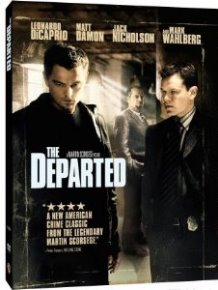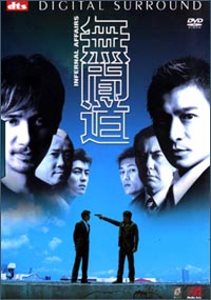The Departed (Martin Scorsese, 2006)
Infernal Affairs (Wai Keung Lau, Siu Fai Mak - 2002)
It is inevitable that we should compare and contrast the adaptation to the original, so there are really four DVD editions we should be looking at: the Blu-ray and SD DVDs of The Departed, and the Hong Kong MegaStar R0 and US Miramax R1 editions of Infernal Affairs. I gather from our esteemed editor that David McCoy is working on a comparison of the Internal Affairs SD's (NOW LOCATED HERE), so my remarks about them will be brief.
There is something to seeing a movie a second time. Sometimes I find that my original complaints and preconceptions resolve themselves into the background. Other times I am clearer about the film's shortcomings. In any case, I am able to see the film in better perspective. Such was the case with The Departed, which I saw first in the theatre and watched again this week on Blu-ray DVD, followed by its antecedent, Infernal Affairs, the 2002 Hong Kong thriller directed by Alan Mak and Andrew Lau (not to be confused with Andy Lau, the actor who plays Ming in the movie.) I had seen Internal Affairs on the Megastar DVD a couple of years before my first crack at The Departed.
For two movies that often seem to share the identical script (save the fact that one of them is in Chinese, the other in English) they are very different animals in many ways: most obviously, the production design; the use of music; and, in the case of The Departed, the creation and fleshing out of subplots and dependence on vulgar language. Both films are about a police detective unit and its target: organized crime - and one mob and its boss in particular. Each side had placed a mole in the other's organization over a length of time. The investigation takes years, during which time both moles rise in importance and responsibility in their respective organizations. Eventually they come to realize that there is a mole in the opposite camp whose identity is unknown to either of them. In a way, they are each looking for their own reflection.
I was particularly interested in the question of adaptation, since so much of the original screenplay is simply lifted and transposed from Hong Kong to Boston. But the differences are often smart, given the target audience. The new film fleshes out character and motivation considerably. By contrast, Infernal Affairs seems to assume that its audience has the genre so much in their bones that set-up and character development can be offered in a few remarks, a glance or way of walking into a room, deliberately avoiding transitions to keep the audience off balance and in much the same dark as its characters. There is one brief scene, for example, where Yan (the DiCaprio character, played by Tony Leung,) encounters an old girlfriend. In a matter of seconds, we learn that he had an aborted love affair while in deep cover some 6 or 7 years earlier – his was a much longer assignment than DiCaprio's. Yan barely has time to register regret before rushing to his next rendezvous with destiny. It's that kind of movie. There are a couple of extended moments of exquisite tenderness, such as when one of Yan's associates dies in his arms. The length and breadth of this scene stands out against an otherwise rapid-fire world of spilt-second life & death decisions.
On the other hand, The Departed gets into a couple of quagmires the more background it offers. Why, we might ask, does boss Nicholson (played with a little too much Charley Partanna meets the Joker, didn't you think?) trust DiCaprio as much he does, given that he knows he is an "ex"–police officer? Screenwriter William Monahan's way out of this question is to make Nicholson's suspicions a focal point of the drama, eventually requiring him to devolve into an emotional meltdown as the truth becomes inescapable. Monahan gets into even more trouble with the character of the police psychiatrist (played, rather appropriately like someone in way over her head, by Vera Farmiga.) She has an extra-office relationship with not one, but both of the moles. While this offers an opportunity to tease us with possibilities of a triple encounter, it stretches believability, and it makes an idiot of the single female character in the film. I don’t see any good reason to have a person with such serious boundary issues among this brew of otherwise clearly motivated characters. (Boss Nicholson, though nuts, is clear about what he's up to.) The role of a therapist is often there to provide an arena for the expression of the internal conflicts of its otherwise constricted characters, and so it does here. But Scorsese's very fine principles, DiCaprio and Matt Damon, make their feelings quite evident in their behavior throughout the film. As a result, the usual function of the therapist has been made redundant, while unnecessarily splitting the narrative.
The Departed leans heavily on character (especially of DiCaprio and Damon) - the music and neighborhood being among the more important. Infernal Affairs, on the other hand, opts for mood and suspense that, in part, is derived from its score. The music for The Departed is largely an inspired pastiche concocted from sources ranging from The Stones to Patsy Cline to bagpipes & drums and The Beach Boys. The score by Chan Kwong Wing to Infernal Affairs is original and supportive of the suspense – rhythmic, rather than tuneful.
I much prefer Eric Tsang's charismatic mob boss to Nicholson. What undoes him isn't rational collapse as it is with Nicholson, it's overconfidence leading to self-imposed insularity. I simply found him more believable. I also bristled whenever Mark Wahlberg did his foul-mouthed, dissing cop routine, which was pretty much all the time. Here the issue for me isn't credibility so much as it is tiresome noise. Happily, there is no analogous character in Internal Affairs. On the other hand, I very much sympathized with Martin Sheen as the police captain. Sheen made DiCaprio's willingness to submit to the horrors of his job acceptable as DiCaprio desperately tried to please his surrogate father.
Thanks to the always inspired cinematography of Christopher Doyle (Hero, 2046, In the Mood for Love, Last Life in the Universe), Infernal Affairs' muted fluorescent green neon lighting simply oozes "underworld." By contrast, The Departed is filmed in vivid color, underscoring its bloody visuals and language, which give the film its signature Scorsese credential. (Which reminds me: Don't Hong Kong cops and gangsters swear – or is it a question of translation? Since I have seen a couple HK gangster movies liberally sprinkled with jockular [sic] epithets and bathroom humor, I suspect it's just a choice.) Infernal Affairs is much tighter and 50 minutes shorter. It refuses to be distracted by gruesome details, extraneous personnel or promises of sexual tension, even when Yan reveals the truth about his assignment to his female psychiatrist, tenderly played by the lovely Kelly Chen, in a fleeting moment of touching intimacy. The film is chock full of supporting characters such as Chen who add dimension, place and credibility, though their on-screen time is correspondingly brief.
For all its brevity and conciseness Infernal Affairs permits a scene very early on that doesn't exist in the adaptation: an extended meeting between the unsuspecting moles, out from under their hats as moles or cops. It's a fascinating idea and serves to lend a tension to all their later near intersections that otherwise would not exist. And, while not played for laughs, the scene has a certain irino-comic feel to it, as the one tries to sell the other a hi-fi system while at the same time whispering to him about how he can get a better deal elsewhere. It's positively brilliant when you consider the parallels to come. (By the way, is it possible writers Felix Chiong and Mak Siu Fai did not know of the nearly identical scene in Fast Times at Ridgemont High!)
I think I was not alone in finding no clear favorite – nor any English language movie that I felt qualified for a nomination for the 2006 Best Picture Oscar. I rather preferred Children of Men to any of those nominated, and I rather liked Johnnie To's stylish gangster film, Exiled, more than The Departed. Even so, I expected Scorsese's film to win, and it did. No hard feelings. As for the Best Actor Oscar, my personal choice was Leonardo DiCaprio for his role in The Departed. I felt this and The Aviator was his best work to date, Gilbert Grape excepted, though I'm sure he was still wincing over his not having been given a chance to lose for Titanic, poor fellow. Of course, as you should be quick to point out, and for reasons passing understanding, DiCaprio wasn't even nominated for The Departed; he was nominated for Blood Diamond, a strong, but forgettable film, not unlike Training Day, The Accused and The Last King of Scotland in this respect, for which the leads won the Oscar.
More on Image:
It may be that I have unfairly set a standard for 480p comparison by relying on the Ayre DX7 instead of a more conventional DVD player, such as might exist in the Blu-ray player of your choice. I estimate that the difference in performance is between 0.5-1.0 points on my ten point scale, depending on the material you are looking at. But the difference in involvement is significant – more than a point, I'd say. I am of two minds about this: On the one hand I want to give 480p a fair shake – thus the Ayre; on the other, I want to offer a comparison that is representative and universally understood. The reason for making a comment at all in this regard, it now seems to me, is to help you make a decision about the urge to upgrade to a BD; and readers of DVD Beaver are more likely to own a conventional DVD player and not something as outrageously expensive as the DX7.
Think of it this way: For the cost of a DVD player that does proper justice to 480p (e.g., from Cyrus, Naim, Arcam, Ayre and others) you could buy a pretty good Blu-ray player plus 100-300 movies and enjoy them in far better resolution and color contrast. Gives one pause, don't it!
I doubt I'll be seeing any Blu-rays that aren't better than the corresponding best SD but, unless you are simply substituting high definition material on principle, there might be good reasons to pass on a particular title. So, from here on, I shall be downgrading SD presentations slightly on the Image scale, though I will no doubt add a comment now and then about how a better SD DVD player might cause you to hold off a reflexive decision to replace the SD.
The Departed (Martin Scorsese, 2006)
The Score Card : BD/SD
The Movie : 7.5
The film's strengths are obvious: a clever and intricate plot, with mostly believable twists, bravura performances from all concerned, a crackerjack finale, and interesting, if weakly articulated, questions of moral ambiguity.
Image : 8.0~9.0
The Blu-ray transfer is superb. Lots of blue, black and red – in all the right places: Vivid, realizing the breadth of Scorsese's stunning color palette, without overblowing the highs or blocking up the dark areas. No distracting signs of artifacts. Those moments of questionable sharpness are, I assume, shot that way. In contrast, the SD edition played on the PS3 often results in cardboard figures instead of a sea of blue, determined men ready to take on the bad guys. Played on the Ayre, things separate out much better, though lacking in resolution compared to the BD. Alas, the SD has the potential of being a fine presentation only when played through suitable components.
Empathy : 9/6
Here's where the SD on the Ayre is more than acceptable in bringing us into the drama. 480p on the PS3 is considerably less effective. Keep in mind this movie is 150 minutes long. You want to be able to stay involved the drama over the length of time, not be concerned with wishing that rapidly moving events were more readily perceived, or that this or that image was clearer or cleaner: So, if you like the movie, by all means, upgrade.
Operations : 8
No objections. Subtitles are in English, French and Spanish, as on the SD.
Extras : 8
The Blu-ray edition includes the same supplementary features as are on the 2-disc SE except, unfortunately, it leaves out the 84 minute TCM profile, "Scorsese on Scorsese." I guess that's what two discs can buy you.
![]()
Infernal Affairs (Wai Keung Lau, Siu Fai Mak - 2002)
I have read that Infernal Affairs almost single-handedly revived the Hong Kong gangster film back in 2002. Together with its very successful sequel the following year, Infernal Affairs made quite an impression and no doubt paved the way for Johnny To to get back on track with his very droll PTU: Police Tactical Unit in 2003, the very dark Election and its sequel in 2005 and 2006, and the rhapsodic Exiled in 2006. Taken together, I think highly of Infernal Affairs and its first sequel (dare I name it: Infernal Affairs II) . . . the second sequel, not so much, nor is it particularly necessary or even useful. Infernal Affairs II takes its time to sort itself out. It's positively sluggish compared to the original, but it also takes its time with character development which, by this time, feels like just what the doctor ordered.
The Score Card : R0/R1
The Movie : 8
The idea behind the title is the concept of "continuous hell" – a place from which you can't escape and where moral clarity is absent. Infernal Affairs stays on track with the question of good and evil as it applies to the two moles because its focus is sharper, less concerned with the texture of supporting characters and situations. Yan has been undercover for ten years; that takes it toll, but it also gives him plenty of time to develop emotional ties with both his police contact and his mob boss.
Image : 4.5~7.0/4-6
The first thing one has to get used to in a back-to-back comparison with The Departed is the desaturated greenish color cast. Green is a favorite hue of Chris Doyle's, so we can assume that in the case of the MegaStar R0, it is deliberate and correct – in contrast to the lack of it in the R1, however sympathetic we may be to its more naturalistic color scheme. The R1 SD of The Departed is sharper more often than the R0 Internal Affairs, but the latter seems to me to be a touch smoother, less grainy, which is unexpected since much of it appears to been shot in low light. Both the R0 and R1 of Infernal Affairs have roughly the same aspect ratio, but the cropping is different: the R1 has a little more vertical, the R0 more horizontal. When Inspector Wong is shown in reflection on the rooftops on his way to meet Tony Leung, he disappears screen right momentarily in the R1 as if the camera can't quite keep up with him, but remains in the frame in the R0. I leave it to you to decide if such things are important. But it is in color contrast that the two editions differ most. The R1 is overall darker, to the point that all daylight scenes appear to have taken place in the middle of a solar eclipse. Dark areas go to black quicker, presenting less of a grayscale. The R0 opens things up more. The R1 feels more oppressive. You might prefer that for this film.
Empathy : 8/6
I found that the compression of color contrast of the R1 made it difficult to hold my attention. The R0 seemed more to be all of a piece and kept me involved all the through it. Your mileage may differ. What do you say, David? (David's comparison is located HERE)
Leonard Norwitz
LensViews
June 17th, 2007





